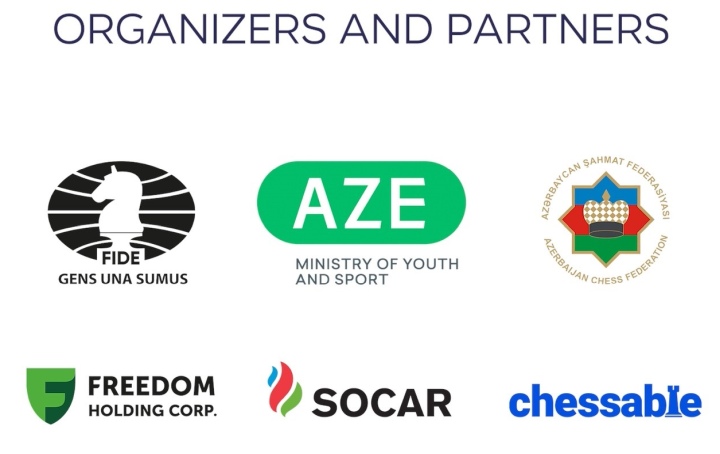Several rating favourites were eliminated in the third stage of the World Cup, including the winner of the 2021 women’s competition and former World Champion, Alexandra Kosteniuk
The most significant upset of the round three tiebreaks occurred as Alexandra Kosteniuk was eliminated by Serbia’s Teodora Injac, who defeated her in both rapid games of the first tiebreak. It was also a challenging day for India’s Harika Dronavalli, who secured her place in round four only after winning the final blitz-game match with a 3+2 time control.

The Open tournament witnessed dramatic eliminations as several top GMs were defeated by rating underdogs. Anish Giri faced a tough battle against Nijat Abasov and was ultimately knocked out after three stages of tiebreaks. Super GMs Teimour Radjabov (who won the 2019 World Cup winner) and Yu Yangyi were also stopped from making it to the next stage.
The Open Tiebreaks:
After an intense series of three tiebreak matches which altogether lasted five hours, Anish Giri was eliminated from the World Cup by the 28-year-old Baku native, Nijat Abasov. In the first rapid match, both sides exchanged victories. The second tiebreak ended with two draws. Then, in the third stage of the tiebreaks – where the time control was 5+3 – the first game ended in a draw, but Giri misplayed in the second and lost.

The 2019 World Cup winner and the hosts’ biggest hope in this edition in Baku, Teimour Radjabov was also knocked out. Spanish GM Jaime Santos Latasa defeated him with black pieces in the first tiebreak rapid game after Radjabov badly misplayed in a rook and queen endgame. The second game ended in a draw despite Santos Latasa being slightly better.
Fabiano Caruana defeated Turkey’s Mustafa Yilmaz 2-0 to qualify for round four and was the only player of the top favourites to finish the tiebreak on 100%.

Wesley So, who faced France’s Jules Moussard, had to go through two rounds of rapid tiebreaks before he could qualify. The two drew both of their first rapid match games. In the second rapid match, So was better at the finish of game one. Game two ended in a draw despite So completely dominating since move 23.
Jan-Krzysztof Duda qualified by capitalising on Ivan Cheparinov’s endgame slip in the rapid. Ian Nepomnichi is also through after Rauf Mamedov blundered towards the endgame in their first rapid duel. Wang Hao defeated England’s David Howell, who also misplayed in the endgame but in the first rapid tiebreaker. Peter Svdler scored a victory against Jorden Van Foreest as Black and then drew in their second rapid game to seal his path to the next stage.

The round three tiebreak seems to have favoured the underdogs as several notably higher-rated GMs were eliminated.
Turkish GM Vahap Sanal won both rapid games against the rating favourite Anton Korobov. In the first game, Korobov completely misplayed and had to give up an exchange, while in the second one, he blundered in the endgame.
Hungary’s Ferenc Berkes (celebrating his birthday tomorrow) is having a great tournament in Baku and is through to Round 4 after knocking out Nikita Vitiugov in the first rapid tiebreaker with 1.5-0.5. It was the third tiebreaker Berkes had to play. In Round 1, he defeated Iran’s Pouria Darani via tiebreaks, then in the second round, he eliminated the former world champion candidate and 2009 World Cup winner Boris Gelfand, also in the tiebreaks.
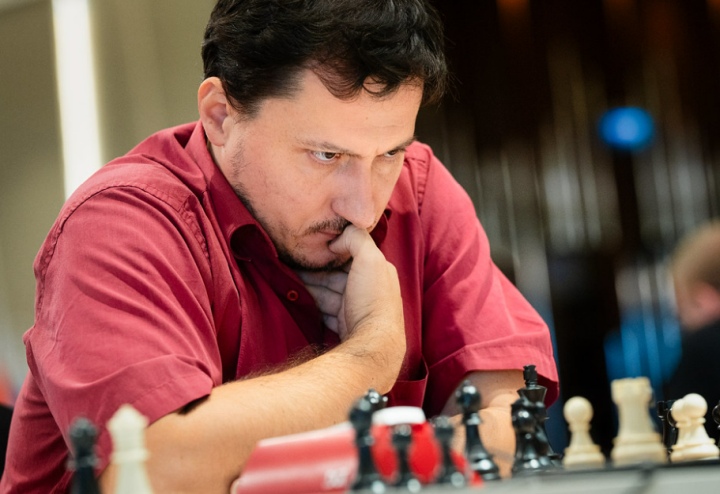
Once France’s leading star player, Etienne Bacrot, eliminated China’s 2700+ strong GM Yu Yangyi, defeating him with black pieces in game two of the rapid. Despite achieving a better position, Yu miscalculated. In an attempt to seize the black king in the centre, he first dropped the advantage and then blundered into a lost position.
Ukraine’s Vasyl Ivanchuk (54) outmatched his opponent, the 30-years-younger and 2700+-rated Chinese GM Wei Yi, defeating him 1.5-0.5. Sweden’s Nils Grandelius prevailed over Amin Bassem by 1.5-0.5 and secured his qualification for the next stage. Nihal Sarin, Salem Saleh, Andrey Esipenko, and Radoslaw Wojtaszek also advanced.
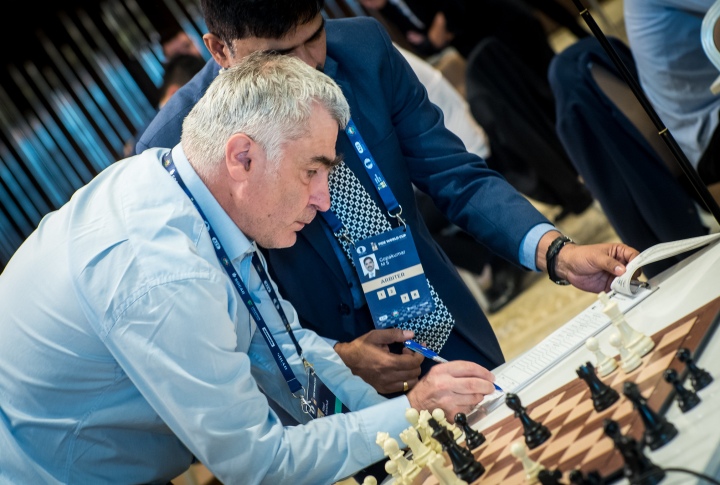
The Women’s Tiebreaks:
In a monumental upset for the women’s tournament, Serbia’s Teodora Injac eliminated Women’s World Cup 2021 winner and former Women’s World Champion Alexandra Kosteniuk, defeating her in both games of the first rapid tiebreak. However, in the first game, Kosteniuk missed an opportunity for a perpetual check, allowing Injac to secure victory.
This was a very long day for India’s Harika Dronavalli, who qualified for Round 4 only after winning the final blitz-game match with a 3+2 time control. Dronavalli was playing Lela Javakhishvili of Georgia after they drew both games in the classical part of round three.
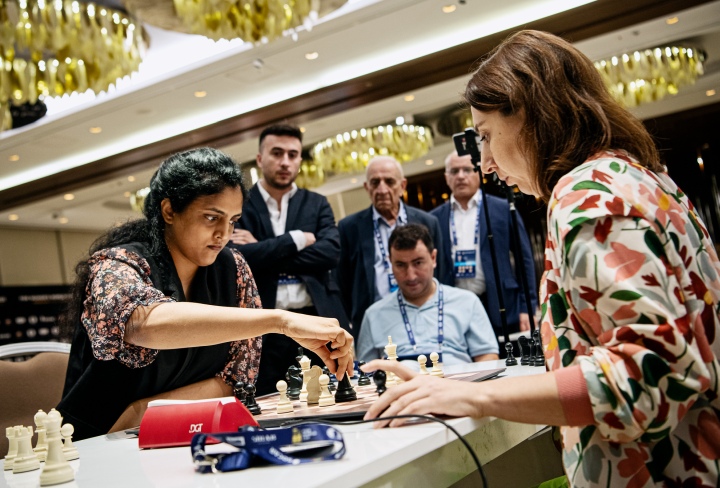
The first rapid match ended with two draws. In the second, Harika scored first, but Lela bounced back in the second. Then, in match three – with a time control of 5+3, both games ended in a draw. In the final two-game match, played under 3+2 time control, game one ended without either side having many chances. But in the second and final game, Harika took advantage of her opponent’s imprecisions and ended in a knight endgame where she was two pawns up, finishing with a victory.
Grandmaster Zhu Jiner (whose title was officiated just recently by FIDE) has qualified after winning both of her rapid games against IM Yuliia Osmak.
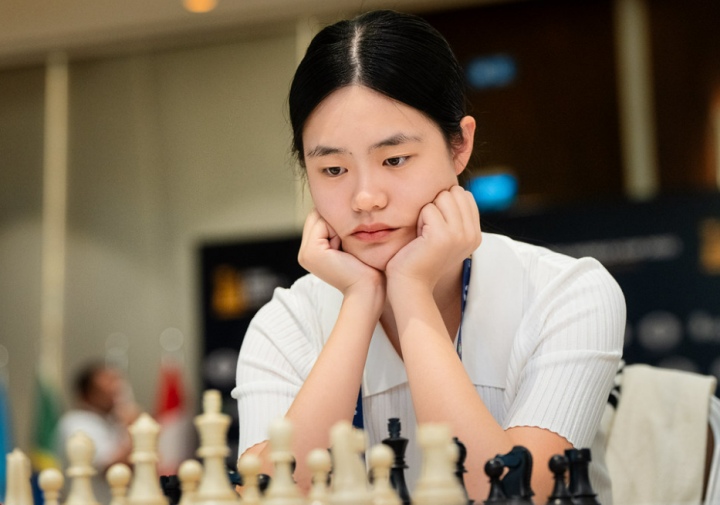
Another Chinese GM and former Women’s World Champion, Tan Zhongyi, is also through, having defeated Estonia’s IM Mai Narva in the second rapid match 2:0 (the first one ended with both sides scoring a victory each).
The full list of the results from the round three tiebreaks can be found here: https://worldcup2023.fide.com/tree.
Top performers head for the Grand Swiss
Before the Baku event, the International chess federation (FIDE) announced that up to three players from those who reach the Round of 16 in the World Cup, and up to two players from the Women’s World Cup Round of 16, who haven’t qualified otherwise, will get a place in the upcoming Grand Swiss which will be held in October.
On the women’s side, the coveted ticket goes to IM Medina Warda Aulia from Indonesia. In the Open event, there is one more round to reach the final 16, but it is already clear that these three players are contending for the Grand Swiss spots: Vocaturo, Berkes, and Vahap. If any of them wins their next match, he will also get a ticket to the Grand Swiss.
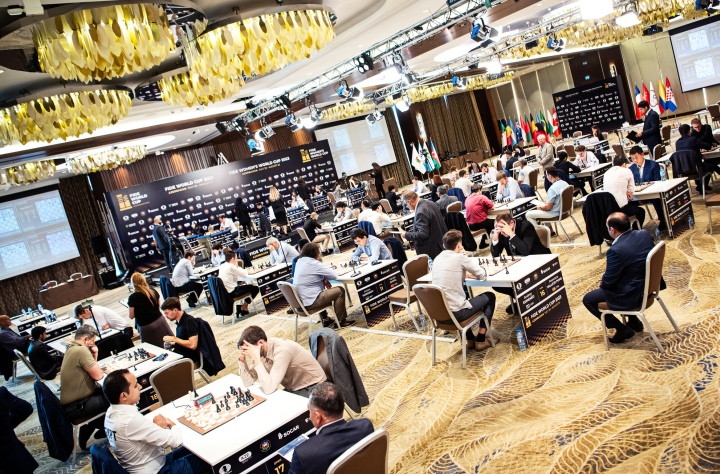
Tuesday, 8th of August will be a rest day. Round four starts on Wednesday, 9th of August at 3 PM local time in Baku, Azerbaijan.
Here follows a look at some of the most interesting positions from the second game of round three:
The breaking point for Anish Giri in today’s tiebreak matches came in the second blitz game of the third tiebreak stage against Nijat Abasov.
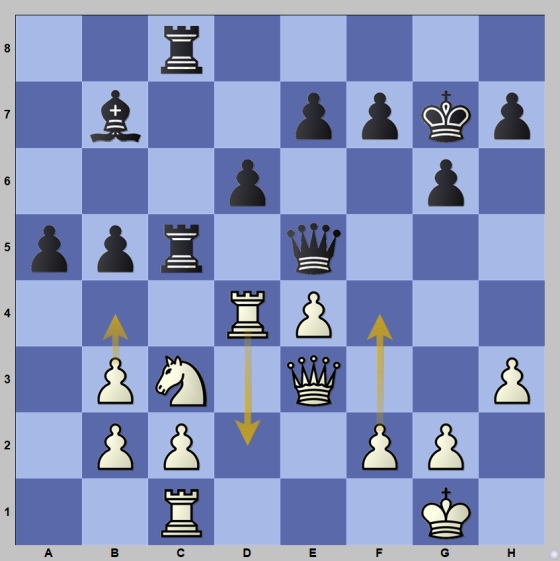
Black is slightly better as he has engineered some play on the queenside. Instead of 26.f4 or 26.Rd2 Anish opted for pseudo-active 26.b4? but after 26…Rc4 27.Rxc4 Rxc4 28.f4 Qe6 29.b3? Rxb4 Black collects his first extra pawn.
30.Re1 Qc8 31.Kh2 Qc5 32.Qd3 and Giri resigned, being significantly weaker and worse on time. 0-1
Teimour Radjabov was unlucky today as he lost in a roughly even position to Jaime Santos Latasa.
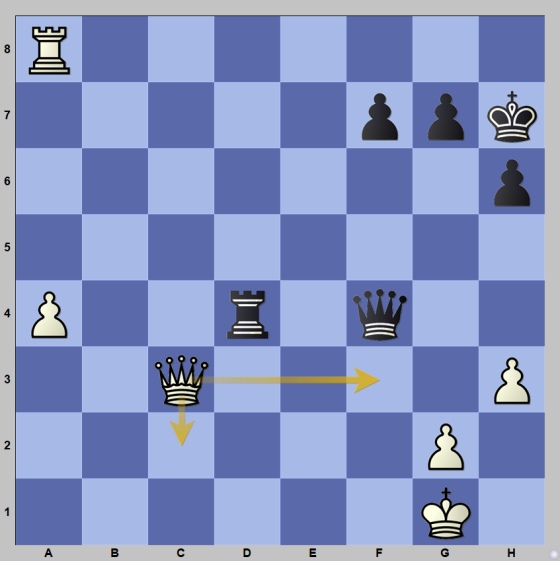
White has an a-runner but his king is exposed and Black has enough countering options. The best move for Radjabov was to continue with Qf3 and offer an exchange. Instead, he played 33.Qc2+? but this natural check turned out to be the decisive mistake.
After simple 33…g6 34.Rf8 and the coming 34…Rc4 White can prevent checkmate only at the cost of his queen. 0-1
In the second game, Santos Latasa was also better in the endgame but went for a draw.
Turkey’s Vahap Sanal outplayed Anton Korobov in both of their games. In the first rapid encounter, Korobov essayed the French Defence but made several mistake transitioning from the opening to the middlegame.
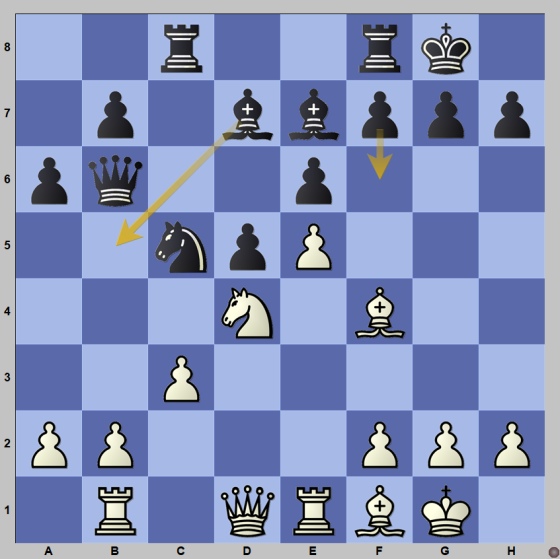
14…Bb5? (after 14…f6 Black is OK) 15.Nxb5 axb5 16.Be3 Qc6 17.Qg4 Ne4? 18.Bh6 g6 19.Bxf8 Bxf8. White won an exchange and converted it into a full point 36 moves later. 1-0
Alexandra Kosteniuk was significantly weaker in both rapid tiebreak games against Serbia’s Teodora Injac. In game one, however, she had a chance to save a draw but missed it.
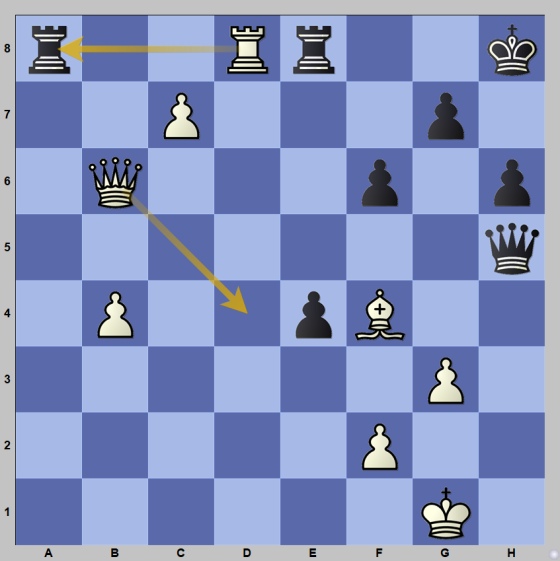
Black is completely lost. White should just proceed with 41.Qd4 – to hold the d8-rook – and after an eventual exchange of pieces on the 8th rank, the white pawn will promote.
Instead, Injac here played 41.Ra8?? dropping victory immediately. Kosteniuk had a chance of a perpetual check with Qd1-f3-h5. In time trouble, she took on a8 and capitulated after 42.Qb8+ Kh7 43.c8Q Ra1+? 44.Bc1 Qd1+ 45.Kh2 Qh5+ 46.Qh3 Qd5 47.Qf4 Qd1 48.Qxe4+ 1-0
Text: Milan Dinic
Photo: Stev Bonhage, Anna Shtourman and Maria Emelianova (chess.com)
About the event
The FIDE World Cup 2023 is taking place from 29 July to 25 August 2023 in Baku, Azerbaijan.
In the Open tournament, 206 players were eligible to take part and 103 in the Women’s event.
There will be eight rounds in the Open and seven in the Women’s tournament. Each round will be played under a knock-out system, consisting of a 2-game match. In the case of a tie, the players will play a rapid and, if necessary, a blitz tiebreak until the winner is determined.
The winners of the top three places in both sections will qualify for the 2024 Candidates tournament.
In both events, the time control for each game is 90 minutes for the first 40 moves, followed by 30 minutes for the rest of the game with an increment of 30 seconds per move starting from move 1.
The prize fund for the entire event is 2.5 million US Dollars, with $1,834,000 in the Open and $676,250 in the Women’s tournament. The 2023 FIDE World Cup has the largest prize fund for any chess tournament ever played.
More information about the event: worldcup2023.fide.com/
Regulations:
Open tournament: handbook.fide.com/files/handbook/WorldCup2023Regulations.pdf
Women’s event: handbook.fide.com/files/handbook/WWorldCup2023Regulations.pdf
Schedule: worldcup2023.fide.com/schedule
